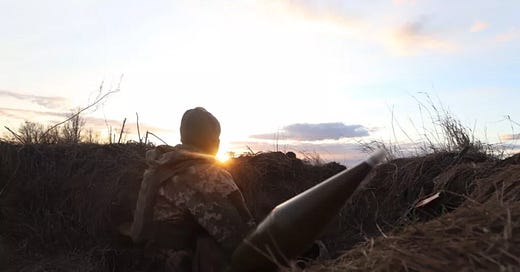“I’m struck,” breathed the New York Times Frank Bruni, observing the invasion of Ukraine, “at this sense of disbelief that all of us seem to feel… This feels like a page from the 20th century. And here we are in the 21st century. And I’m struck by this sense I pick up in everyone around me that the world, we were somehow past this, that war in Europe was something that we wouldn’t see.”
“The Russian attempt to seize Ukraine is a throwback to earlier centuries,” echoed Thomas Friedman. “Our world is not going to be the same again because this war has no historical parallel. It is a raw, 18th-century-style land grab by a superpower – but in a 21st-century globalized world.”
“You just don’t in the 21st century behave in 19th century fashion by invading another country,” exclaimed John Kerry, eight whole years ago.
I’m struck, for my part, by the uniformity of the language we’ve seen used by much of the Western world’s blurry-eyed and slack-jawed commentariat to describe their feelings these last few days. By the nearly identical incredulity that something is now happening which is not meant to happen, that the world is not functioning as it’s supposed to function.
Watching as so many stumble around in a daze, as if having just been awakened momentarily from a deep slumber, I can’t help but recall the neoconservative Robert Kagan’s 2009 book, The Return of History and the End of Dreams. I don’t think it was a great book, frankly, but I do love the title. Because for at least three decades now the Western world has been living in a dream.
In this dream, history left the past behind and humanity was reborn into a new world. In this world progress only marched, inexorably, in one direction: toward a great flattening of space and time and difference, in which all the peoples of the earth, once fallen and scattered, would be knit back together again by the golden threads of communication and commerce. First Europe and then in time the world would be united, whole and free. Someday they would, together, take to the stars and embrace their boundless destiny.
There were still challenges to be overcome, of course. Poverty and parasitic worms; rogue states and trans-national troublemakers. But such remaining unpleasantness was merely an expected holdover from the drama of mankind’s previous existence. In time all his tribal national loyalties, his fervors and irrationalities, his envies and hatreds, would be subsumed as his material privations and wants were met and his understanding grew. Eventually the better angels of his nature would triumph and War would fade from the earth – along with Famine, Pestilence, and, perhaps in time, even Death.
Kant’s Kingdom of Perpetual Peace would at last be established on earth.
This was the dream of global liberalism, made dream-able by the momentary advent of unipolar American hyperpower in the wake of the last Cold War. For years since that moment every bump and jolt that threatened to jostle the sleepwalking Western world out of this dream, from America’s disastrous wars in Iraq and Afghanistan to the rise of China, seems to have provoked only a little tossing and turning between snores.
But now it seems Vladimir Putin may have succeeded at last. Startled awake by another major war in Europe, the liberal establishment may have, just maybe, now sat up and realized they’ve been under the spell of the “Great Delusion” – as the indefatigably realist scholar John Mearsheimer has memorably dubbed it – this whole time. And that in the 21st century the world is pretty much the same as it ever was in any other century.
Maybe now you think this is yet another essay on whether NATO expansion was historical folly, and whether war in Ukraine might have been avoided by a more realistic foreign policy. But I promise you it’s not (plus there’s a little twist at the end). I want to put those debates aside to try to make a broader point here. Because the delusions that have prevailed for so long now have run deeper than international relations theory.




